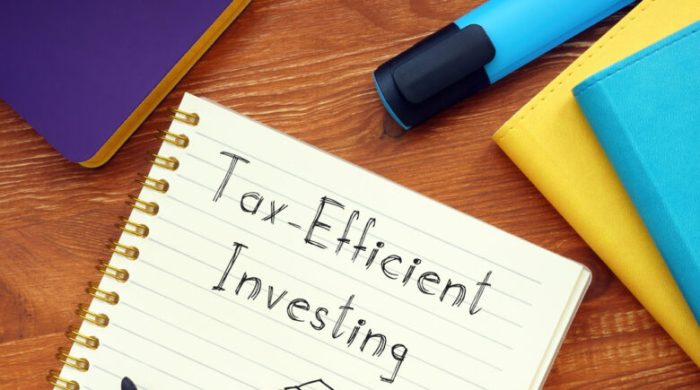Yo, get ready to dive into the world of tax-efficient investing! This ain’t your typical boring finance talk – we’re spicing things up with tips and tricks to help you keep more of your hard-earned cash.
So buckle up, ‘cause we’re about to break down what tax-efficient investing is all about and how it can level up your money game.
What is Tax-Efficient Investing?
Tax-efficient investing is a strategy used by investors to minimize the impact of taxes on their investment returns. It is crucial in wealth management as it helps individuals keep more of their earnings by reducing tax liabilities.
Tax-efficient investing differs from traditional investing strategies because it focuses on maximizing after-tax returns rather than just looking at pre-tax gains. This means considering the tax implications of investment decisions and using strategies to optimize tax efficiency.
Examples of Tax-Efficient Investment Vehicles or Strategies
- Investing in tax-advantaged accounts like 401(k)s or IRAs, where contributions are tax-deductible and earnings grow tax-deferred.
- Utilizing tax-loss harvesting to offset capital gains with capital losses in a portfolio.
- Choosing tax-efficient mutual funds or ETFs that have low turnover and minimize capital gains distributions.
- Investing in municipal bonds that offer tax-free interest income at the federal or state level.
Benefits of Tax-Efficient Investing
Tax-efficient investing is like hitting a sweet spot with your money game. It’s all about making smart moves to keep more of your hard-earned cash in your pocket. Let’s break it down and see why it’s the real deal.
Maximizing Returns
When you’re on that tax-efficient grind, you’re not just investing for the sake of it. You’re strategizing to minimize the taxes you pay on your investment gains. That means more money stays with you, helping you grow those stacks faster. It’s like leveling up in your finance game while keeping Uncle Sam at bay.
Tax Implications of Different Options
Not all investments are created equal when it comes to taxes. Some options can hit you with heavy tax bills, eating into your profits. But with tax-efficient investing, you choose investments that have lower tax consequences. It’s like picking the winning team that not only performs well but also keeps your wallet happy.
Strategies for Tax-Efficient Investing
Investing in a tax-efficient manner can help maximize your returns by minimizing the impact of taxes on your investments. Here are some strategies to consider:
Asset Location
When it comes to asset location, the idea is to place investments in accounts that offer the most tax advantages. For example, holding tax-efficient investments like index funds in taxable accounts and tax-inefficient investments like bonds in tax-advantaged accounts can help reduce your tax liability.
Tax-Loss Harvesting
Tax-loss harvesting involves selling investments that have experienced a loss to offset gains in other investments. By strategically realizing losses, you can reduce your taxable income and potentially lower your overall tax bill. Just be mindful of wash sale rules to avoid triggering penalties.
Utilizing Tax-Advantaged Accounts
Tax-advantaged accounts like IRAs, 401(k)s, and 529 plans offer tax benefits that can help you grow your investments more efficiently. By taking advantage of these accounts, you can defer or eliminate taxes on your contributions, earnings, or withdrawals, depending on the account type.
Considerations for Tax-Efficient Investing

When diving into the world of tax-efficient investing, there are several key factors to consider in order to maximize your returns while minimizing tax liabilities over the long term.
1. Choosing Tax-Efficient Investments
- Look for investments with low turnover ratios to reduce capital gains distributions.
- Consider tax-exempt municipal bonds to generate tax-free income.
- Focus on investments with long-term capital gains tax rates for favorable tax treatment.
2. Impact of Taxes on Investment Returns
Understanding how taxes can eat into your investment returns is crucial for long-term success. High tax rates on gains can significantly reduce your overall profits. It’s important to factor in taxes when calculating your investment performance to get a more accurate picture of your returns.
3. Aligning Investment Goals with Tax-Efficient Strategies
- Consider your investment timeline and risk tolerance when choosing tax-efficient strategies.
- Opt for tax-advantaged accounts like IRAs and 401(k)s to shelter investments from taxes.
- Regularly review and rebalance your portfolio to ensure it remains tax-efficient based on your current financial situation.
